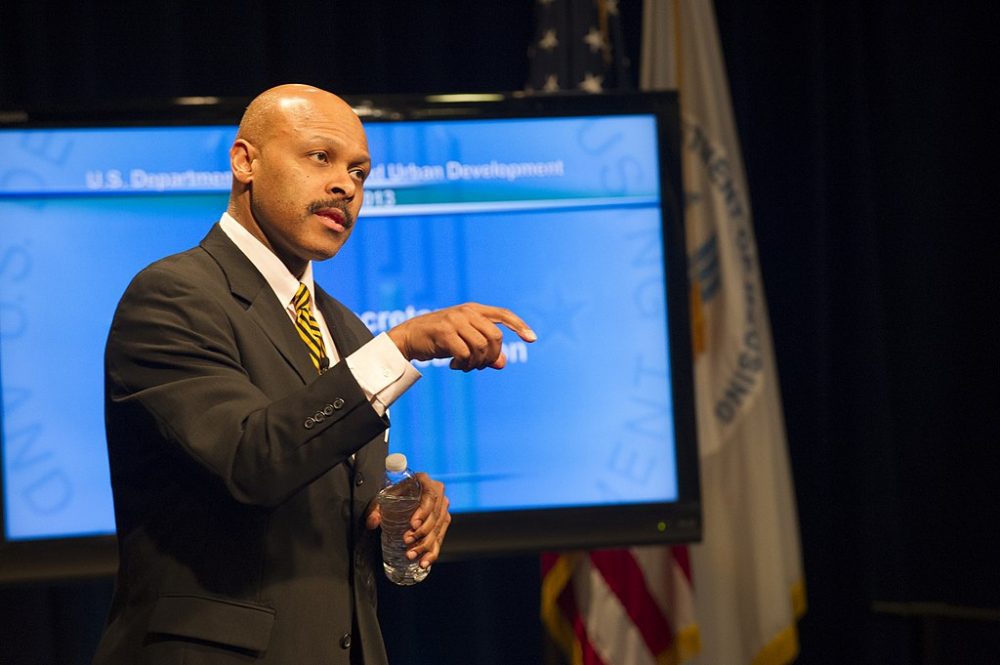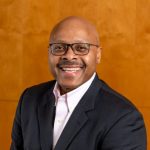
Maurice Jones served as deputy secretary at HUD during the Obama administration. Photo by HUD’s Sammy Mayo Jr., via Wikimedia Commons
In the community development field, Maurice Jones is something of a superstar. The Virginia native was LISC’s president and CEO and one of the key architects of the organization’s widely successful efforts to partner with health care institutions. Jones also served as Virginia’s Secretary of Commerce and Trade, and was a deputy secretary at HUD under President Obama.
About a year ago, Jones left LISC to become CEO of OneTen, a new organization. The group is a coalition of about 60 employers—including AT&T, Walmart, Bank of America, and other linchpins of American commerce—that are committed to hiring and promoting 1 million Black workers without four-year degrees to family-sustaining jobs over the next decade.
Simultaneously, OneTen is forming partnerships with community colleges and organizations offering job training and apprenticeships, as well as with groups that can offer support services to workers. “It’s a skills-first approach to hiring, a skills-first approach to upward mobility,” says Jones.
I spoke with Jones about OneTen and why its mission inspired him, his career trajectory, and the perspective he’s gained over the years.
Amanda Abrams: I know you had been CEO of LISC for several years. Why did you decide to leave in order to lead OneTen?

Maurice Jones, CEO of OneTen
Maurice Jones: I switched because I’ve not seen a private sector effort of this intentionality and this promise in my lifetime. In my mind, this effort is too important to fail. When it comes to wealth building, it’s one of those fundamental things we’ve got to get right in order to create a land of opportunity, a land where you really can be born anywhere and be president one day. I wanted to exhaust myself working on behalf of this.
How is OneTen’s mission going to further that vision?
Right now, if you look at jobs that pay $40,000 and above, 71 percent of them require that you have a four-year degree [according to a proprietary analysis of multiple data sources completed for OneTen]. There’s this barrier to earning your way into the middle class in the form of a credential—a college degree—that may or may not have anything to do with the skills needed to do the job. We’re saying focus on the skills and the multiple ways through which one can come about the skills. Because if you look at the workforce ages 25 and above, 76 percent of Black talent do not yet have a four-year degree. So this four-year degree requirement is having a huge, huge adverse impact on Black talent earning their way into the middle class.
Was there a shift in thinking among corporate leaders after the outcry following George Floyd’s murder about what needs to be done to close the wealth and equity gap?
But for 2020, there would be no OneTen. In 2020, you had the commencement of a pandemic that has had a disproportionately adverse impact on Black communities and other communities of color. You also had a recession that had the same disproportionately adverse impact on the same communities. You then also had a series of killings: Ahmaud Arbery, Breonna Taylor, and most especially the murder of Mr. George Floyd in broad daylight. That moved corporate CEOs to say, “We have to do something that is significant to help form a more perfect union.” And when I say they, a few leaders came together: Ken Frazier from Merck, Ken Chenault from American Express, Ginni Rometty from IBM, Charles Phillips from Infor, and Kevin Sharer from Amgen. These CEOs came together and called on their colleagues to step up. And they did. So 2020 really, really did move folks in the corporate community to say, “There are self-inflicted wounds here. We can do better.” I continue to see action on the part of the corporate community that is intentionally focused on this work, like no time in my life before.
I know there was a lot of talk about “Will this new attitude stick?” in terms of the awareness of racial injustice in our society. But it seems like it’s sticking in many places.
It’s sticking. And look, there are 10 million unfilled jobs across the country today. And there are 10 million underemployed Black talent. So you also have the economy that is really motivating employers to find new channels for talent that they are leaving on the sidelines.
It sounds like you’re largely targeting corporate jobs. What about jobs like construction, electrical, and other trades?
It’s all over the map. It’s IT, it’s electrical, it’s HR, it’s finance, it’s sales. There are a host of job categories that are applicable here and we’re focusing on all of them.
But if this means deemphasizing a four-year degree, is that going to turn college into an elite good? Obviously it isn’t for everybody or for every job. But on the other hand, college is about more than just specific job skills, right?
It’s not a deemphasis on college at all. It is saying we need to have more pathways to the middle class than just a four-year degree. For some people, college is not open to them at this stage of their life. Does that mean they shouldn’t have a pathway to the middle class? Otherwise, guess who gets disproportionately impacted? People of color, people from rural areas, people living in low-wealth communities. It’s a recipe for two Washington, D.C.s; two Richmond, Virginias; two Charlotte, North Carolinas.
I noticed there have been a number of new initiatives focused on jobs and access to capital for Black Americans lately. Do you think there’s been an evolution in thinking among advocates that that’s a better way to build wealth than, say, housing?
No, actually, it’s all of the above. When you look at building wealth in America, there are several key components. One still is homeownership. It still is, in fact, the largest source of wealth in the country. However, the best housing policy is a good job. The best education policy is a good job. Fundamental at the core of wealth building is a quality job that allows you to invest in your education, invest in homeownership, invest in savings. What’s happening now is you’ve got people working two or three jobs and still not making a living wage. It’s not just about wealth; that’s also about dignity. If you work 40 hours a week in America, you should be earning a living wage; I don’t care what the job is.
What attracted you to LISC and why did you decide to take that job when you did?
I wanted to be at LISC to do comprehensive community development work, which definitely includes housing, but also included workforce development, small-business work, economic development work. LISC in my mind is the most comprehensive community development organization out there, and I wanted to go to it because I wanted to work in a community development organization that actually did housing-plus. Housing is certainly important, but housing by itself is not going to build wealth.
A couple of years ago, for a research project, I spoke with Sentara Healthcare CEO Howard Kern, and he said that you personally convinced him to commit $50 million from the institution for community development efforts. How were you able to be so successful with that?
If you really want to make people healthy, and you claim that that’s what you’re doing, then you have to be in the housing space. You have to be in the healthy food space. You have to be in the living wage space. Fortunately for us, health care enterprises have been recognizing this for quite some time and have been looking for partners to work with. When I got to LISC, my view was, let me start aggressively pursuing health care enterprises as a partner to the community development industry. And so that’s what I did. We put together a proposal that we were going to spend $10 billion over 10 years, pursuing social determinants of health work. And we challenged hospital systems to join us in that. And to Howard Kern and Sentara’s credit, they stepped up and said, “Absolutely. We’ll do this with you.” But so did places like ProMedica in Toledo, Ohio, and other places like Atrium and Kaiser Permanente. It was clear to me that they were allies in the same cause, and they’re still doing it. LISC represented an organization that had a track record of doing this kind of work—doing it prudently, doing it effectively, and mitigating risk. And doing it on a scale that nobody else is doing it. So that appealed to these places in a big way.
Do you think health care institutions’ investments in community development will continue to expand?
I think it will. You can’t do health and not do social determinants of health. And you need partners outside of your walls to do it. As we continue to fight COVID, I think you’re going to see more of a return to social determinants. When you look at some of the first 40 years of the CDFI industry, and you look at the largest private-sector partner industries to it, it’s probably financial institutions and philanthropy.
‘in the next 10 years, if the health care industry is not one of the anchor partner industries of the community development industry, then we will have missed an opportunity.’
However, in the next 10 years, if the health care industry is not one of the anchor partner industries of the community development industry, then we will have missed an opportunity. Because when you look at mission, the alignment is even closer with health care than it is with financial institutions.
Your resume is incredible, and it looks like you’ve had many jobs that were aiming to make a difference. For example, you were the publisher of The Virginian-Pilot, and worked in various federal and state administrations. Were you driven by the idea of service and trying to figure out how to do the most good?
Absolutely. I’ve been blessed: I had these incredible grandparents who raised me, and then I got scholarships to go to school. I want to use those blessings to be blessings to others. And so, yes, I have looked for job opportunities that have allowed me to be of service to others. I was attracted to the newspaper because it is both a business and a public service. There were other corporate opportunities I had, but if they didn’t have that thing in it as well, it just wasn’t attractive to me.
Has your sense of what makes the most difference evolved?
Yeah. At one point I thought, OK, the way you really help people build wealth is help them get educated. And by golly I wish there were just one thing that we needed to do. But over time what I’ve learned is that there are at least four categories that you really should be working in simultaneously to help people in communities truly build sustainable wealth. If you think of it as a square, there are at least four corners to wealth building.
Homeownership and small business ownership are in there. The access to capital piece is another. The community assets piece too: I would put health care and education in there. And then my other corner, if you will, would be quality jobs. So one reason why OneTen appeals to me is this quality jobs piece, which in my mind is fundamental to wealth building.
Does it feel kind of like whack-a-mole? Like you strengthen one area but then another goes lacking and needs attention?
Actually, no, because they’re all connected. The real game is, can you integrate them? Can you take them out of silos and thread them together? That was one of my lessons—because my thought was OK, I’m just going to lean into education and that’s it. But we know that there are barriers to opportunity even amongst the most educated, so you’ve got to have all of these things. And so the real question, and the real riddle that I continue to work on in my life’s journey, is how do you thread these things together? When I figure that out, I’ll come back to you and let you know.
Thank you.




Comments